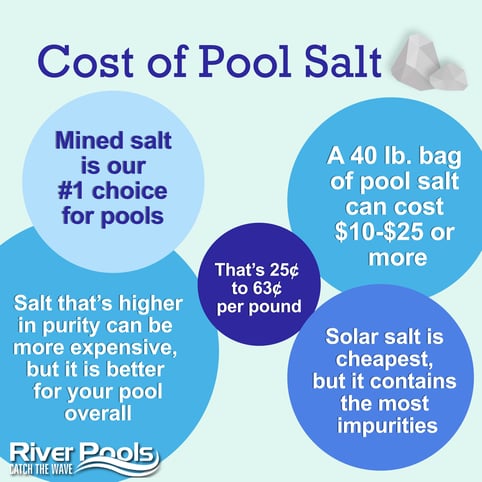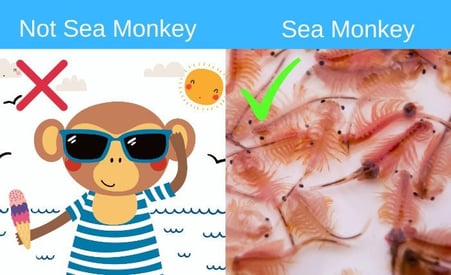Inground Saltwater Pool Cost: Salt, Cells, Generators, and More
January 10th, 2020
5 min read
By Jason Hughes

We’ll be upfront with you - a saltwater pool costs about as much as a traditional chlorine pool. If that’s what you were looking for, feel free to exit this page.
If, however, you’d like to learn more about saltwater pool costs, keep reading because we’re going to cover all angles of this topic.
At River Pools, we specialize in fiberglass pools, and we’ve noticed an increased interest in salt systems over the years. If you’re wondering how much pool salt, salt chlorine generators, or salt system parts cost, we explain all of this and more in the following sections.
Why Choose a Saltwater Pool?
Saltwater pools aren’t for everyone, but they do come with a few key benefits:
- The water feels silkier
- Your annual costs will be lower (most years)
- Your pool won’t have that chlorine smell
- The water is gentler on the skin and eyes
How Much Does an Inground Saltwater Pool Cost?
As we mentioned earlier, saltwater pools cost about the same to own and operate as traditional chlorine pools (compare saltwater pools and chlorine pools here). However, your expenses will be scattered over time. Most years, the cost to run your saltwater pool will be much lower than the cost of operating a chlorine pool.
Let’s break down the cost of a salt chlorine generator, the cost of the salt, and the price range for replacement parts.
Cost of Saltwater Chlorinator
Realistically, you can expect to pay $1,700 to $2,500 upfront for your salt chlorine generator. A new generator should already come with a cell and control board, so you won’t have to buy these parts separately. (Check out our article on saltwater pools to learn how a saltwater chlorinator works.)
Cost of Pool Salt
The overall cost of salt for a saltwater pool will vary by the type of salt that you use and the size of your pool, but you can expect to pay on average between $10 and $25 per every 40 pounds of salt (or 25¢ to 63¢ per pound of salt). Some brands may even sell a 40-pound bag of pool salt for as much as $40.
For context, a brand new pool can require 40-50 pounds of salt for every 2,000 gallons of water. Assuming a 40-pound bag of salt costs an average of $18, a small pool like our R20 might need $72 of salt to start up, a medium pool like our D32 might need around $180 of salt, and a large pool like our T40 might need $270 or more of salt.
How will you know how much salt to add once your pool is up and running? You’ll need to test your pool water and add salt accordingly to keep the chlorine levels balanced.

Your pool salt options include solar salt, mechanically evaporated salt, and mined salt. What’s the difference?
Solar salt comes from seawater (the water is evaporated in the sun until only the salt is left behind). Solar salt isn’t our first choice because it contains...wait for it…dead sea monkeys and bacteria. We honestly don’t know whether to laugh or cry. The most important thing to know is that these impurities can make your generator work harder to produce chlorine.

Mechanically evaporated salt is similar to solar salt, but a heat source other than the sun is used to evaporate the water. The heat burns off the organic matter (the dead sea monkeys and bacteria), making it easier for your cell to operate, but it can leave behind some mineral contaminants that aren’t good for your pool.
Mined salt (what we recommend) is the purest form of salt and the best salt for your swimming pool. It dissolves the fastest and will be easiest on your generator and your pool as a whole. It can also be the most expensive, while solar salt is often the least expensive.
Regardless of the type of salt that you use, the salt for your swimming pool needs to be:
- Specifically for swimming pools
- Food-grade
- Granular
- Non-iodized
Cost to Replace Your Salt Chlorine Generator Cell
When it’s time to replace your salt chlorine generator cell, you can expect to pay between $700 and $1,100 for a new one. Most people find that they need to replace their cell every 3-7 years, depending on the quality of the salt used and how well they maintain their pool.
Pro Tip: To make your cell last as long as possible, use high-quality salt and only clean the cell when necessary.
Cost to Replace Your Control Board
The control board is the part of the generator that supplies electricity to the cell. Most control boards will last 3-7 years on average. When it's time to get a new control board, you can expect to pay between $500 and $900.
Inground Saltwater Pool Problems
Inground saltwater pools aren’t problem-free, and there are a few things that you need to consider before you install or switch to a salt system:
- Watch out for calcium chloride. If you use calcium chloride on a saltwater pool, it can affect the hardness of the water and form deposits on the walls if the concentration is too high.
- Avoid using rock salt (halite) because it won’t fully dissolve and can cause problems.
- A high salt level can cause your chlorinator to shut down, so make sure to check your chemical levels regularly.
- Saltwater is more conductive to electricity, so if you have a faulty light or an improperly bonded pool, steer clear of salt systems (and get your pool fixed!).
Damage, Corrosion, Erosion...5 More Things You Need to Know
#1. The cost to maintain your saltwater pool can go up if you have a pool type that’s incompatible with salt systems. While you can install a salt system on any pool, some pools will deteriorate at a faster rate as a result.
Vinyl liner pools with metal walls can develop corrosion and holes, which puts the pool at risk for leaks and shortens its lifespan. Concrete pools with plaster finishes work fine with salt, but the salt can erode the plaster surface faster (this will force you to resurface your pool more often). Fiberglass pools work great with salt systems, though.
#2. Metal handrails, ladders, and other pool parts can quickly corrode as well if you have a salt system.
#3. Saltwater can also damage and corrode automatic pool cover systems (there are a lot of metal parts close to the water). These parts are hard to replace and can be expensive to repair, so we don’t recommend adding an automatic pool cover to your saltwater pool (and we don’t recommend a salt system if you already have an automatic pool cover).
#4. Staining is a common problem in concrete pools. Use salt that is at least 95% pure (preferably 99%) to avoid staining your pool and to minimize the risk of damaging your equipment.
#5. It’s easy to forget to maintain your pool when you have a salt system, but it’s very important that you regularly test your water chemistry. Once you test your water, you can adjust your system’s chlorine production rate according to your test results. Doing this about once a week will ultimately extend the life of your pool and your salt chlorine generator.
Have other questions about inground saltwater pools or how much they cost? Ask us in the comments, and we’ll answer you as soon as possible.
If you’re interested in getting a salt system, you may want to consider choosing a fiberglass swimming pool. Out of all the inground pool types, fiberglass pools by far work best with saltwater chlorinators. You can check out our catalog of models, browse our gallery, or visit our learning center today to learn more.
Want to know how much fiberglass pools cost? Try out our fiberglass pool pricing calculator, or click the button below to request pricing.
Before you go, be sure to download your free ebook to get started on your journey to a fiberglass pool. Happy Swimming!
Up Next:
Top 5 Salt Water Chlorine Generator Problems
Swimming Pool Sanitizers: The 7 Best Options to Consider
Inground Swimming Pool Maintenance Costs: Chemicals, Electricity, and More
Editor's note: This article was updated on December 21, 2023.
Jason Hughes is a partner at River Pools Virginia, a fiberglass pool installation company based in Warsaw, Virginia. With over 20 years of hands-on experience, Jason has dedicated his career to helping families create beautiful, functional backyards while ensuring every fiberglass pool installation meets the highest standards of quality and safety. In addition to his work with homeowners, Jason serves as a GENESIS instructor with the Pool & Hot Tub Alliance (PHTA), where he teaches fiberglass pool installation best practices to pool professionals across the country. Whether he’s on a job site or leading a training session, Jason is passionate about raising the bar for fiberglass pool installations and helping families make confident, informed decisions as they transform their outdoor spaces.


